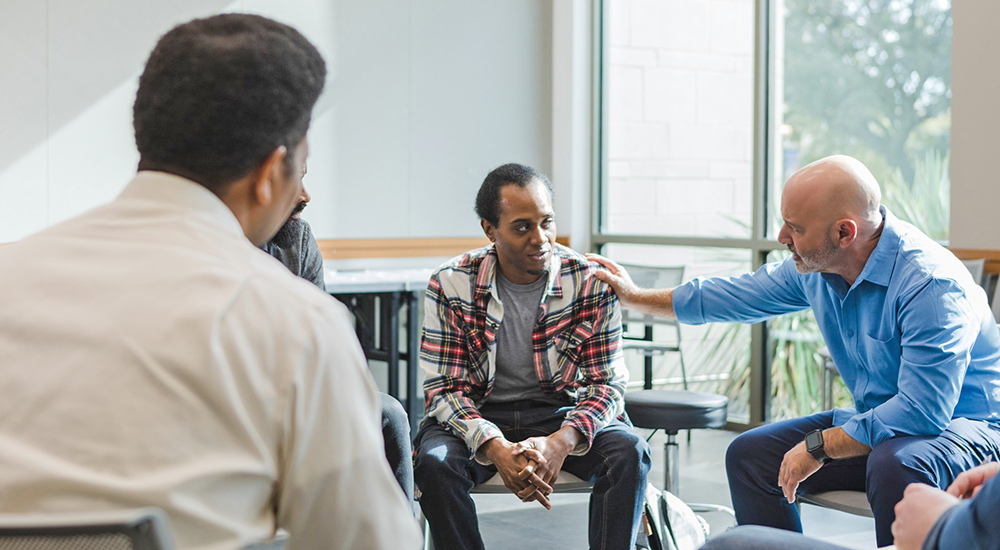“Veterans have options when it comes to their PTSD treatment,” said Dr. Elissa McCarthy, clinical psychologist with the National Center for PTSD. “One option is a VA mental health residential treatment program. These programs provide a unique opportunity and environment for healing and recovery.”
Veterans who attend a VA mental health residential treatment program live at the program facility for two weeks to a few months. This may be at a VA hospital or in the community. Residential treatment programs are often best for Veterans who need additional structure in their day along with more intensive treatment than outpatient care provides. Veterans in residential care participate in daily treatment activities as well as support services that address other needs like employment or overall health and well-being.
There are several types of mental health residential treatment programs available through VA, including programs that address PTSD, substance use or other mental health concerns. Programs focus on different areas of recovery depending on the recommended mental health treatment.
“Residential care offers a focused setting for Veterans to pursue meaning and purpose. It’s a chance to get a new lease on life while receiving effective treatments for their mental health needs,” McCarthy said.
When is a residential treatment program a good option?
For most Veterans, outpatient treatment is the best level of care. Veterans may consider residential treatment if:
- They have not been able to fully engage in outpatient treatment. For example, if the Veteran can’t get to an outpatient clinic on a regular basis.
- The severity of their symptoms has become unmanageable and disrupts their day-to-day life. For example, a Veteran living with PTSD may be trying to address the problems PTSD has caused yet still sees how PTSD continues to have a large negative impact on daily life.
- They live in an environment that is not supporting their recovery. Residential programs offer several treatment sessions per day and 24/7 access to treatment team members.
Mental health treatment is not one-size-fits-all. The right treatment is the one that works best for the individual Veteran. Typically, the Veteran and a member of their treatment team will work together to identify a program that fits their treatment needs and preferences.
What’s it like to participate in the program?
During their stay, Veterans participate in at least four hours of treatment each day. This may include individual sessions focused on treating PTSD. There may also be group sessions focused on topics such as spirituality, relapse-prevention, coping skills and general health and wellness.
Group sessions provide Veterans an opportunity to connect with others going through similar experiences.
“Healthy relationships are a very important part of recovery. For a Veteran to be able to meet others they relate to, who are going through what they are, and to discuss personal experiences in this safe space, it’s a really great environment,” McCarthy added.
Throughout the program, Veterans will learn skills and access tools that will help them stay active in their own recovery.
Find a residential treatment program
If a Veteran is interested in a VA mental health residential treatment program, talking to a mental health care provider is a great first step. A mental health treatment provider can make a referral to VA, or Veterans can refer themselves.
Once VA receives a referral, a Veteran may participate in an initial screening and information session about the program. This may be a phone call, a telehealth appointment or an in-person meeting. Within several days of the initial screening, VA will let the Veteran know their residential treatment options.
What happens when a Veteran completes the program?
Before completing residential treatment, the VA residential treatment team coordinates with the Veteran’s outpatient treatment team to schedule follow-up appointments after discharge. This helps provide a smooth transition out of the residential treatment facility.
“After completing a residential treatment program, Veterans often feel like they’re no longer just getting through life, they’re living life. Regardless of the type of treatment you choose, don’t wait. PTSD treatment works and it can help you get your life back,” McCarthy said.
Resources
Get more information about PTSD and treatment programs.
If you have questions about the different types of treatment for PTSD, visit:
Topics in this story
More Stories
Study underscores important role COVID vaccination can have in protecting Veterans from infection and reducing long-term health consequences
Columbia VA’s robotic surgery teams completed their 800th robotic surgery and are on schedule to hit 1,000 by the end of the year.
In a decentralized clinical trial, Veterans can participate from their own homes or local VA instead of having to travel to a research site.








Definitely a great service needed by a lot of Vets…theres a lot of negatives with the VA services..there s a lot of positives as well that never get spoken of this is definitely beautiful..the VA going above and beyond.
Present-Centered Therapy (PCT)
PCT focuses on learning how to deal with current life problems related to your traumatic experience or PTSD symptoms in ways that are adaptive.
Why not use this approach in group of Veterans while at an older age . With problems and concerns that come with getting to the end of your life. These are unique from younger Veterans concerns.